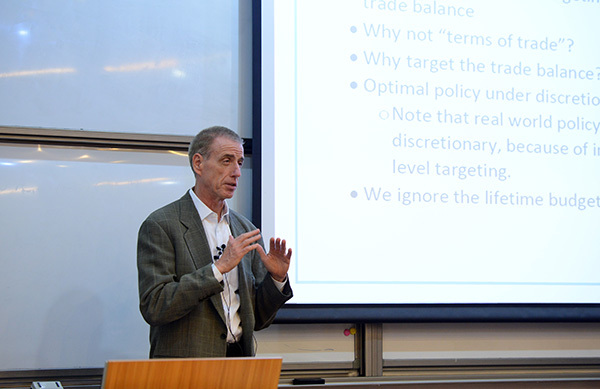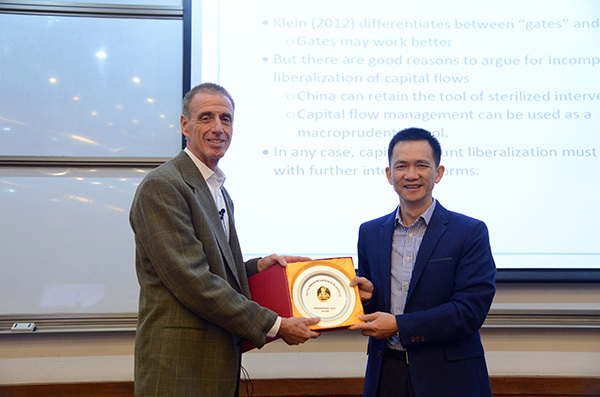
Background introduction: 15th October 2018 – the 16th Yan Fu Memorial Lecture in Economics was held in the National School of Development, Peking University. Yan Fu Memorial Lecture in Economics commenced in 2001 to commemorate Mr. Yan Fu’s contributions, as well as to perpetuate his legacy in promoting the discipline of economics of modern China. Every year, the National School of Development extends invitation to one internationally renowned economist to speak as guest lecturer. The guest lecturer for this year’s Yan Fu Lecture is Professor Charles Engel, Professor of Economics at the University of Wisconsin – Madison. Professor Engel contributed significantly in the field of international economics, and macro-economics etc.

In recent years, China slowly relaxed its control towards capital inflow and outflow, as academics and decision makers began to re-evaluate the effects of capital control on macro-prudential policy. Some opined that capital control can be an effective macro-prudential tool, to protect a nation from aggressive inflow of hot-money, and to ensure exchange rate stability. Professor Engel also discussed on the pro and cons of capital control, and assessed the effects of capital control on sterilizing intervention policies of the foreign currency market.
Professor Engel first reviewed China’s exchange rate policy and current account status. Prior to the exchange rate reform in 2005, China adopted the pegged exchange rate system, and its currency value only began to appreciate after 2005. At the same time, the current account surplus of China in 2001 only contributes 1% towards it’s GDP. The number then increased drastically in the following 6 years, and dropped again towards the end of 2011. Therefore, many analysts were of the opinion that China practiced “exchange rate manipulation” prior to 2005, to improve trade balances. However, Professor Engel pointed out that, during the 1997-1998 financial crisis period, many East Asian Countries like South Korea, Malaysia, Thailand, and Indonesia experienced more than 50% devaluation of their respective currencies, and if China seeks to improve its current account surplus through exchange rate manipulation, it should also devalue further against USA (dollar). Instead, China maintained a fixed exchange rate, which can be logically construed as an attempt to signal investors on its economic stability. He concluded that there are 3 aspects on China’s exchange rate policy: (1) Stability in exchange rate expectation, as partial representation on promises of stability policy, (2) Exchange rate adjustment to handle misplacement reflected in trade balance; (3) Trade balance’s eventual goal to achieve overall equilibrium, or small surplus. It is due to strict control on capital inflow and outflow, that China managed to ensure separation and independence between exchange rate adjustment and monetary policy implementation. Although some capital can flow freely, internal capital still weathers outflow pressure, while external capital contains inflow pressure. Klein (2012) described China’s capital control mechanism as being a “wall” instead of a “door”.
Professor Engel embarked on the “Impossible Trinity”,and pointed out that under the criteria of “Uncovered Interest Rate Parity UIRP”, a pegged exchange rate system or a system with targeted goal for devaluation, shall reduce independence of monetary policy. “Exchange rate intervention” or “Sterilized Intervention” usually adopts 2 methods in using capital control to adjust exchange rate, without affecting monetary policy – First is to ensure the balance sheet volume of Central Bank remained unchanged, i.e. – Selling China’s domestic bond concurrently, when purchasing foreign government bond. Second is to maintain the volume of foreign currency reserve, i.e. - to issue “Sterilizing bond” concurrently when purchasing foreign government bond.
Due to China’s common practice of capital control, it can also adopt sterilizing intervention as one of its policy instruments outside the scope of monetary policy. This however cannot be done in the USA, which does not practice capital control. Ceteris paribus, countries with more policy instruments tend to enjoy more benefits. However, Professor Engel opined that, even without achieving policy-cooperation status between both countries, USA can still benefit from China’s “Exchange Rate Manipulation”. When prices of nominal commodities become stickier, fluctuations in exchange rate could still be contorted even if the asset pricing of capital market is effective.
To characterise the influence of China’s exchange rate policy on the USA, Professor Engel introduced an abstract theoretical model: A model that sets China as domestic country, and USA as foreign country. It is also an open economy macroeconomics model that includes family unit, intermediate product manufacturer, final product manufacturer and other sections, factoring in nominal price stickiness – where condition of trade can be affected by nominal exchange rate. It hypothesizes that Domestic Country (China) deploys two types of policy instruments, i.e. monetary policy and sterilizing intervention, to strife for the most optimum output and trade balance, while Foreign Country (USA) only deploys monetary policy as the only mean, to pick the most optimum output level realization. Analyzed results of the model showed, that there is bigger room for Domestic Country (China) to strive for a balance among inflation, output and trade balance, for example, trade surplus can be reduced by adopting expansionary inflation policy, while Foreign Country (USA) has lesser room to balance its policies. However, will Foreign Country’s welfare be compromised by Domestic Country’s adoption of sterilized intervention policy? Professor Engel further compared scenario where both countries only adopt monetary policy solely, and discovered that Domestic Country (China) would have suffered deteriorating welfare level when there are lesser policy instruments. At the same time, due to Domestic Country (China) inability to hedge on the effect of productivity impact and demand impact on trade balance through sterilized intervention policy, the fluctuating trade balance causes the deterioration of Foreign Country’s welfare too. Professor Engel pointed that the same conclusion also stands in situation where both countries adopt contrasting goals in trade balance. In this case, sterilized intervention policy shall strengthen exchange rate and stability of trade balance, which are beneficial to both China and USA.
Professor Engel also emphasized, that the analysis of this theoretical model disregarded drawbacks of capital control, where in reality capital control often weaken capital deployment, prevent decentralized allocation, can be dodged easily, and aggravates corruption. Therefore, one of the condition precedents for capital account opening, is to reform domestic market, through – strengthening protection on property rights, and reduction in corruption. Upon completing domestic market reform, capital inflow and outflow can be improved by relaxing capital control, where capital inflow becomes dominant. However, deficient domestic market reform shall cause the dominance of capital outflow. “Dishonest” domestic investors will seek “protection” under foreign capital, while foreign investors become reluctant to enter domestic market. Lastly, Professor Engel concluded that although the “door” of capital control might be more efficient than the “wall”, China can still maintain its sterilized intervention policy, turning capital flow management into one of the macro-prudential policy tools.

During the question and answer session, Professor Engel responded to questions from participaters and students. At last, Dean Yao Yang presented a special souvenir of Yan Fu Memorial Lecture in Economics to Professor Engel, on behalf of the institution, and the lecture ended with a big round of applause from the audiences.
(Author: Ge Tingting)